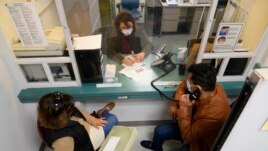03 January 2022
American government and non-governmental groups are working to settle almost 100,000 Afghans in the United States by next September. The effort supports the Biden administration's Operation Allies Welcome plan created to help Afghans who fled their country when the Taliban seized control of the government in August. The U.S. and allied military forces had just withdrawn from Afghanistan after 20 years of war there.
The U.S. Department of State says that almost 48,000 Afghan refugees have already moved off U.S. military bases since summer. They are settled in communities across the U.S.

Mohammad Attaie and his wife Deena, newly arrived from Afghanistan, get help from medical translator Jahannaz Afshar making a doctor's visit at the Valley Health Center TB/Refugee Program in San Jose, California, on December 9, 2021. (AP Photo/Eric Risberg)
Krish O'Mara Vignarajah is president of Lutheran Immigration and Refugee Service, one of nine national resettlement agencies. She said the community reaction has been large and good.
"We know that resettlement isn't a weeks-long or months-long process. Success requires years of effort. And so that's where it's really important to have strong community ties," Vignarajah said.
The nonprofit, which operates in around half of U.S. states, has resettled roughly 6,000 newly arrived Afghans since the summer.
In San Jose, California, the TB and Refugee Clinic at Santa Clara Valley Medical Center is providing health checks for Afghans in that area.
But the center needs additional employees to deal with the 800 refugees expected in the area through September 2022. Nelda David is the health center's administrator. She said the center cleared only about 100 refugees in the last financial year. It does not know when these new refugees will arrive.
Most of the employees are immigrants or former refugees themselves. They understand the difficulties of starting over in a new country. David said the lack of employees will not stop them from welcoming the refugees.
Medical interpreter Jahannaz Afshar welcomes Farsi speakers at the front door before they begin their first visit. She explains what to expect over at least four visits as part of a complete health check. It includes checking for infectious diseases and administering vaccines if necessary.
All refugees are required to have a medical examination to settle in the U.S.
Afshar moved from Iran in 2004, so she also talks with refugees about American culture, such as how much personal space and small talk Americans like. She says she tells refugees people in the U.S. help others without expecting anything in return.
Afshar said she cannot imagine what the refugees are going through. The former clothes designer and her husband were not refugees. They did not flee a country destroyed by war when they chose to leave Iran. And yet, she too struggled at first.
"And this is one of the things that I always share," she said. "That even though it's going to be hard, later you're going to be happy because ... you're going to learn so much and you're going to grow so much."
I'm Gregory Stachel.
Janie Har reported this story for The Associated Press. Gregory Stachel adapted it for VOA Learning English.
__________________________________________________
Words in This Story
interpret – v. to translate the words that someone is speaking into a different language: to repeat what someone says in a different language than the language originally used